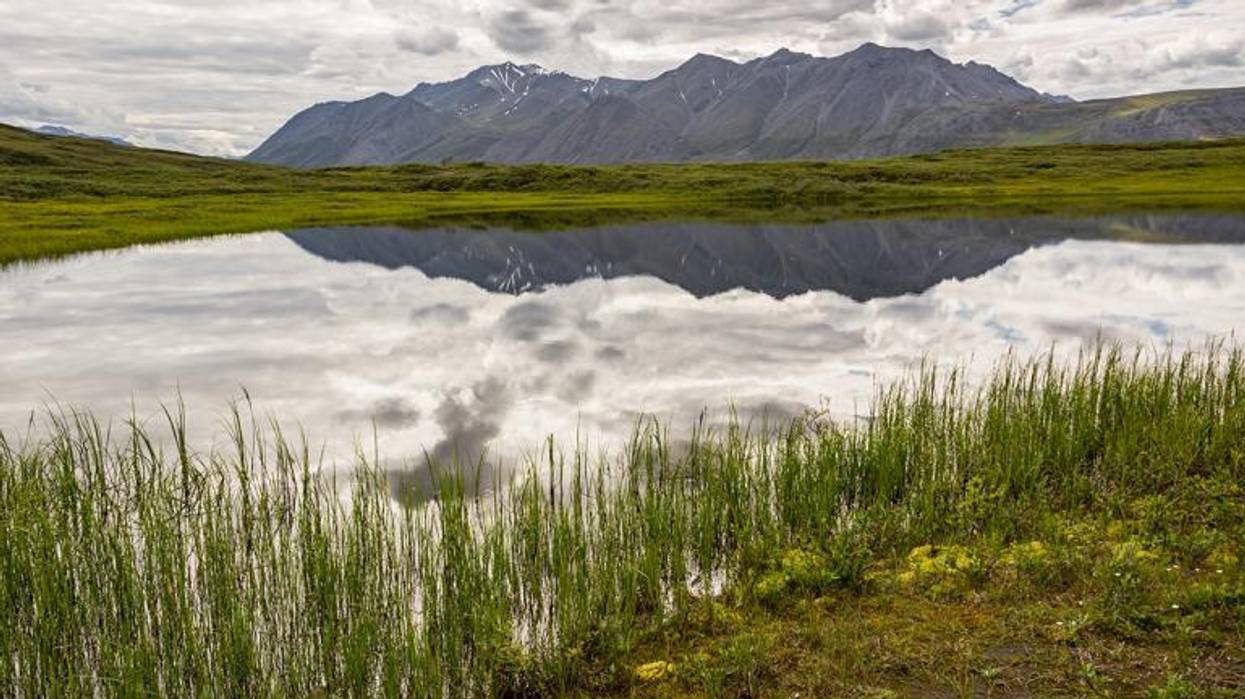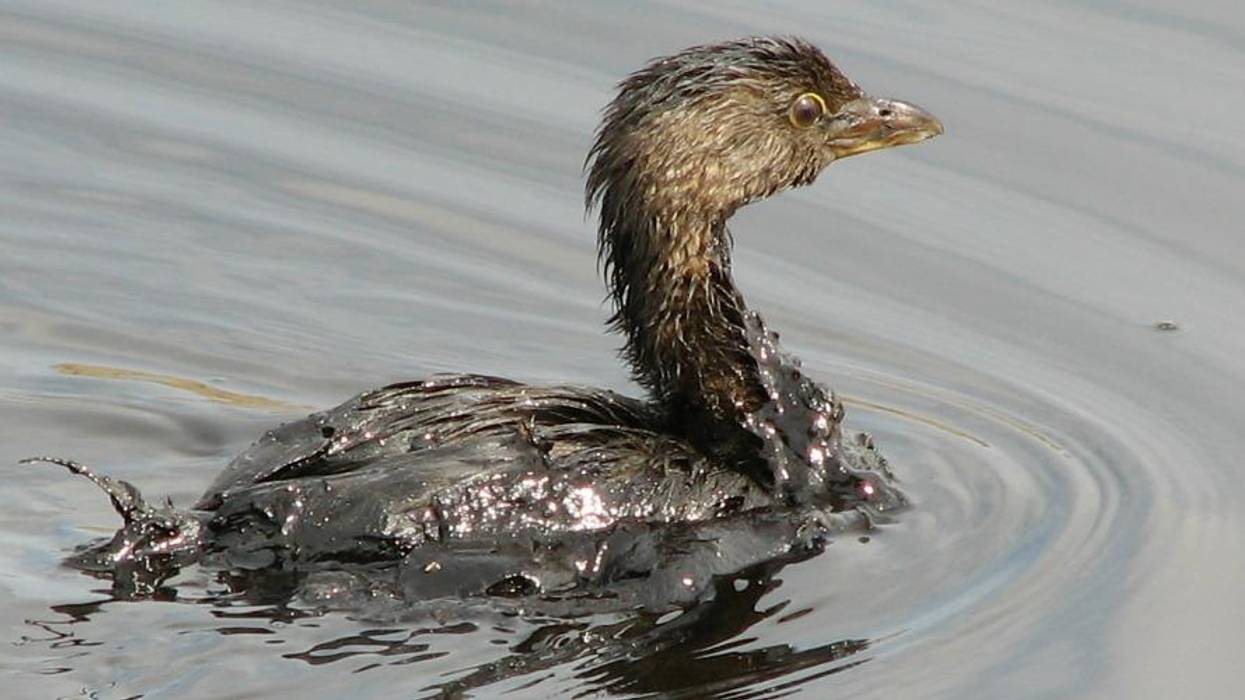Turns Out That the Oil Industry Wasn't Interested in the Arctic Refuge After All
The Trump administration’s Arctic Refuge oil lease auction was a total bust.
On the afternoon of Wednesday, January 6--as many Americans were transfixed by the violent insurrectionists laying siege to the US Capitol--the Department of the Interior was undertaking what some conservationists have likened to another kind of plunder: the first ever oil and gas lease sale in one of North America's most iconic wilderness landscapes.
For more than 40 years, environmentalists and Republicans in Congress have battled over the fate of the Arctic National Wildlife Refuge's coastal plain, a 1.6 million-acre stretch of fragile tundra at the edge of the Arctic sea. In 2017, with a two-page provision tucked into the Tax Cuts and Jobs Act, Donald Trump achieved what no other Republican president had been able to: opening up the refuge to oil and gas exploration and development. The lease sale was, in a way, the culmination of one of the defining environmental struggles of the last half-century.
Not surprisingly, the Trump administration considered Arctic Refuge drilling among its biggest accomplishments, as Interior Secretary David Bernhardt told the Conservative Political Action Conference last year. The Alaska Congressional delegation viewed it as a major triumph. Industry boosters and the Congressional Budget Office claimed that the lease sales--the Tax Act requires two over the course of the next decade--would be a windfall for the US Treasury and the state of Alaska and that it would help to replenish the dwindling life-blood of the Trans Alaska Pipeline.
But, ultimately, the first lease sale was a flop. Only half of the parcels attracted a bid, many of them at bare minimum prices. The Alaska Wilderness League called the lease auction an "epic failure."
Even before last Wednesday's sale, there were signs that this idea was largely a fantasy. In 2019 British Petroleum sold off all of its assets on the North Slope, including the closely guarded results of the single test well drilled on refuge lands, in what many viewed as a sign of the inevitable long-term decline of Alaska's oil and gas industry. Meanwhile, more than a dozen banks in the US, Canada, and Europe pledged not to finance development projects in the Arctic. The rush to lease in the refuge was unfolding without a very clear understanding of the coastal plain's resource potential, making any investment that much more risky. To top it all off, Joe Biden's presidential election victory ensured that the incoming administration would do everything in its power to protect the region.
That's where things stood when DOI's Deputy Secretary Kate MacGregor, who had traveled to Anchorage for the lease sale, approached the lectern and began opening bids. "It is my honor to preside over this momentous occasion," she said before thanking those who had worked for decades to promote domestic energy production and job creation in Alaska.
But in less than ten minutes the sale was over. There were only 13 bids on 11 of 22 tracts. Most bids were at or just above the minimum of $25/acre and the sale netted only $14.4 million, a far cry from what the CBO had estimated. Even the pro-industry website Petroleum News described the results as "somewhat disappointing."
Perhaps most surprising and controversial was that nearly all of the bids--9 of the 11 awarded--were submitted by a state-owned investment corporation, not the oil and gas industry. The Alaska Investment Development and Export Authority (AIDEA) was created by the state legislature in 1967 to help foster economic growth largely by partnering with banks to provide low cost loans to businesses. Board members are appointed by the governor and profits are pumped back into the corporation or shared with the state. In recent years, however, AIDEA has come under fire for its lack of transparency and what many view as ill-advised investments in energy development projects.
The decision to bid on refuge leases was no exception. AIDEA made a cryptic announcement on Friday, December 18 that it would be meeting in executive session two days before Christmas to discuss "confidential matters" and vote on a resolution related to the Arctic Infrastructure Development Fund. The following Monday, under pressure from activists and journalists, AIDEA finally released the resolution on whether to spend up to $20 million on the lease sale. Despite an outpouring of criticism from the public, it passed unanimously.
The Arctic National Wildlife Refuge has always been a larger than life symbol, both to the environmentalists and Indigenous Gwich'in who have sought to protect it and the politicians who have tried for decades to open it to development.
Rick Steiner, a conservation biologist in Anchorage who tracks AIDEA closely, believes that the authority not only violated Alaska's public meeting law by not providing proper notice but also may not qualify as an eligible bidder. Because the state of Alaska receives half of the lease sale revenue, AIDEA has a competitive advantage, Steiner says. In addition the authority has presented no clear investment plan for the leases, which Steiner says is required by the corporation's own by-laws. Finally, the authority's board members have not been confirmed by the Alaska legislature adding another layer of legal uncertainty.
"AIDEA is clearly out of control," Steiner told me. "And they know it." Steiner filed a complaint with the Department of the Interior's inspector general in December alleging that the corporation is an ineligible bidder under federal law and that all of its bids should be rejected. According to Steiner, the inspector general's office has told him that they are hoping to issue a decision or referral before the end of this week.
A spokesperson with the Inspector General's office said the complaint is going through the standard intake process. AIDEA did not respond to multiple requests for comment.
Meanwhile, the Bureau of Land Management is moving quickly to finalize the leases before Trump leaves office, which would make it more difficult for the incoming administration to delay or possibly invalidate them. An antitrust review coordinated with DOJ, and which usually takes up to two months, has been completed in just days according to an email obtained by Steiner and bid acceptance letters were sent out last week. AIDEA has 15 days to respond.
Larry Persily, who served on the AIDEA board from 1999 to 2002 and now owns a weekly print newspaper in Wrangell, said that bidding on refuge leases is not the first bad investment AIDEA has made. He points to the authority's decision in the late 1990s to finance a "value added" seafood processing plant in Anchorage that went bust. AIDEA ended up losing about half of the $50 million it had invested in the project. "That was their biggest boondoggle I can remember," Persily said. "It definitely gave them a black eye."
More recently, the authority put $70 million into financing a North Slope oil and gas operation, since purchased by a Singapore-based petroleum company, which has struggled to make its quarterly loan payments. They agency has also been criticized (and sued) for backing the Ambler Road project, a more than 200-mile mining access road through pristine wilderness lands including part of Gates of the Arctic National Park. Two days after the lease sale, AIDEA and DOI signed a 50-year right-of-way permit for the project.
"The [Arctic Refuge] thing was sort of their sticking their toe back into the waters of dumb ideas," Persily said.
Even if AIDEA is deemed to be an eligible bidder and the leases are signed before Biden takes office, the path forward for the state of Alaska is not a promising one. The leasing program will be tied up in courts for months if not years and a judge could send DOI back to square one, forcing the agency to redo the environmental impact statement. In theory a Democratic controlled Congress could vote to permanently protect the coastal plain, though the party's slim majority in the Senate will make this difficult. (See: Manchin, Joe; Senator from West Virginia.) Either way, AIDEA will be stuck with the leases and ultimately the legal fees required if they challenge whatever decisions the Biden administration makes.
It would be foolish to read too much into a single lease sale, held during a pandemic and at a time of historically low oil and gas prices. After all there's plenty of new oil and gas development on Alaska's North Slope, much of it on state land and to the west of the refuge in the National Petroleum Reserve.
But the Arctic National Wildlife Refuge has always been a larger than life symbol, both to the environmentalists and Indigenous Gwich'in who have sought to protect it and the politicians who have tried for decades to open it to development. How badly industry wanted it, however, was always a bit of a mystery. Now, it seems, we have our answer: industry didn't want it very much.
During the livestreaming of the lease sale, DOI's MacGregor said that developing the refuge would "reinvigorate" the Trans Alaska Pipeline, which Alaska's politicians have long promised. But the outcome of the sale presages a different future, one that by necessity doesn't rely so heavily on oil and gas extraction. And this is something the state may have no control over.
"If they had held the sale 20 years ago it would have turned out much differently," Persily said. "Regardless of whether it was a good idea then, its time has passed."


